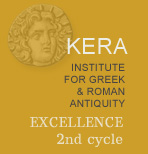Main Site . Other insciptions from the main site of Boubon
30. Honorary inscription for a deceased citizen
![]()
5 10 |
[ – – – ca. 15 – – – – – – ]ο[ – – – ca. 13– – – – – ] [ – – ca. 9 – – –] κ̣αὶ μ̣ε̣γαλόφρ̣ο̣[να ̣ ̣̣– – ca. 7 – – ] [ – – ca. 7 – –̣ π]α̣ιδείᾳ κοσ̣μηθ̣έ[ντα – – ca. 7 – – ] [ ca. 4 – ψη]φ̣ίσμασιν κ̣αὶ ὑπὸ E[ – 5-7 – –καὶ] [ὑπὸ τῆς π]ό̣λεως δ̣ι′ ἣ̣ν̣ ἐπ̣οιή̣[σατο βίου] [ἀναστρο]φ̣ὴν καὶ ἄσκησιν̣ [ ̣– – – – ca. 9 ––] [ – 3–4 – καταλ]ιπόντα τῇ πατρίδι [– –7–8– –] [ – – –7–8– – – –]λ̣ιν πρὸς καιρὸν γεν[όμενον] [ – – –7–8– – – –]ω̣ς συμφορὰν ἐκ τῆς [ – – ca. 6 – ] [ – – ca. 6– – γέν]ους ὑπάρξαντα ἀρ̣[ – ca. 5 – –] [ – – –9–10– – – – –]ῶν Σεβαστῶν κ[ – –5–6 – – ] [ – – – ca. 11 – – ] ἐπαρχείᾳ κα̣[ – –7–8– – – –] ------------------------------------- |
[-------------] and generous [-------] adorned with learning [-------------] through decrees [----------] of the city for the way he conducted [his life -------] and exercised [------] left the city heir [------] timely [------] the disaster from [------] been of descent [------] of the Augusti [------] the province [-------------]
Rectangular base found and documented by Heberdey in Boubon (no further specification) in 1895. Schindler's description appears to be based on autopsy. The upper part of the stone was missing entirely and the inscribed surface was broken on all sides, but the original length of the stone could be established: on the left of l. 4 ca. 13 cm. missing, on the right ca. 15 cm, so the original length must have been ca. 88 cm.
Height: 64 cm; length: 60 cm; depth: ca. 55 cm; letters: 2.25 cm.
Schindler 1972, no. 9 (pl. 4.18: Heberdey's sqeeze); Milner 1998, p. 2, no. 1.22; BullÉp 1973, no. 455.
L. 7-9 : Robert (in BullÉp) notes that the word συμφορά (stroke of fate involving human loss, catastrophe) is typical of the vocabulary of honorary decrees postmortem. These lines may, therefore, have contained some sort of reference to the honorand's service to his city through his will ([καταλ]ιπόντα τῇ πατρίδι) in relation perhaps to the moment (πρὸς καιρόν) of his death, a death that was perhaps described as a tragedy (συμφοράν). On the other hand, this vocabulary also fits another context, that of an endowment made in order to provide relief from a natural catastrophe. The funds donated through this citizen's bequest may have been destined to help alleviate the consequences of a disaster, possibly an earthquake.

